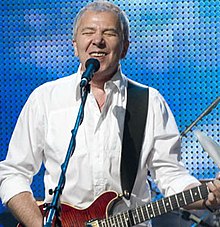Kto winowat?
| Kto winowat? | |
|---|---|
| Voskressenije | |
| publication | 1979 |
| length | 3:45 |
| Genre (s) | Folk rock , blues rock |
| Author (s) | Alexei Romanov |
| album | Woskressenije 1 |
Kto winowat? ( Russian Кто виноват?, wiss. transliteration Kto vinovat?, German Who is to blame? ) is a song by the Soviet rock musician Alexei Romanow , which was best known in the interpretation of the group Woskressenije . It appeared for the first time on their album Woskressenije 1 and is considered the "first pessimistic hymn of the Soviet hippies" and enjoyed or is enjoying great popularity. In the list of the 100 best Russian rock songs of the 20th century by the radio station “Our Radio” ( Russian: Наше радио ), the song took 9th place.
Emergence
Romanov was a member of Andrei Makarevich's group Maschina Wremeni in 1974/75 . During this time he wrote the melody and shortly afterwards the lyrics of the song. Romanov wanted to write an "asymmetrical poem" by his own admission. After he left Maschina Wremeni, he founded the band "Опасная зона" (German: "Danger Zone") with Makarewitsch, which in 1976 was renamed "Кузнецкий мост" (German: "Kusnetzki Bridge"), and took Kto winowat? into the repertoire of the new group.
In the first half of 1979 Maschina Wremeni practically broke up when first the drummer Sergei Kawagoe and, shortly afterwards, the bassist Evgeni Margulis left the group. Together with Romanov, who had just finished his studies, and Andrei Makarewitsch and Andrei Sapunow , they founded the group "Voskressenije". The group soon began recording their first album in the studio of the State Theater Institute in Moscow. Since the group lacked new compositions, some of the older songs by Romanov, including Kto winowat? recorded.
distribution
The finished recordings were given to Dmitry Linnik, a friend of the musicians who worked for the state radio . The song was first broadcast by the World Moscow Radio Service ( Russian Всемирной службы Московского радио ), which wanted to convey a positive image of the Soviet Union on the eve of the 1980 Summer Olympics in Moscow . Although the broadcasting of the station was aimed at Western Europe, it could also be heard on medium wave in Moscow and the surrounding area. The song quickly gained popularity and at the end of the year it took 5th place in the charts of the Moskovsky Komsomolets newspaper , ahead of Poworot in the group "Maschina Wremeni".
The song appeared on three of the four albums of "Woskressenije". According to Romanov, producers were not interested in anything but kto winowat? came on the record, apparently it seemed enough for them to bask in the splendor of the release of an immortal hit.
admission
Andrei Romanow took over the vocals and the rhythm guitar , Andrei Sapunow the backing vocals and the lead guitar . Bass and harmonica were taken over by Yevgeny Margulis. The line-up was supplemented by Alexei Makarewitsch on guitar and Sergei Kawagoe on drums . Alexander Kutikow acted as the sound director .
text
In the text the listener is asked who is to blame for life not going as expected. All in all, life seems long and as an endless string of hardships and plagues until one dies at some point. However, it is also reminded that with every victory there is also a loss and that the relationship between success and effort is balanced.
Alexei Romanov, in his own words, was surprised that the text was received as provocative and dissident. He denies any ulterior motives, but thinks that the quote from classic Russian literature - Kto winowat? is the title of a two-part novel by Alexander Herzen - that struck a chord with the audience. Romanov did not want to play the song for a while and did not play it either, but ultimately had to bow to the wishes of the audience.
Web links
- Сергей Курий. часть 1: История песни "Кто Виноват" (1980). - В: Хиты группы ВОСКРЕСЕНИЕ // Время Z: журнал. - 2014. - № 2. (Russian)
- Lyrics of the song (russian)
- "79" is at Discogs.com
- "Kto winowat?" on Discogs.com
Individual evidence
- ↑ Кушнир, Александр Исаакович: 100 магнитоальбомов советского рока , Крафт +, 2003, ISBN 5-7784-0251-1 (Russian)
- ↑ 100 лучших песен русского рока в XX веке . December 31, 1999. Retrieved April 2, 2016.
- ↑ Михаил Марголис: От Таллина-76 до "Маленького принца» и развала in Затяжной поворот: история группы "Машина времени» , Амфора, 2009, ISBN 978-5-367-00880-7 (Russian).
